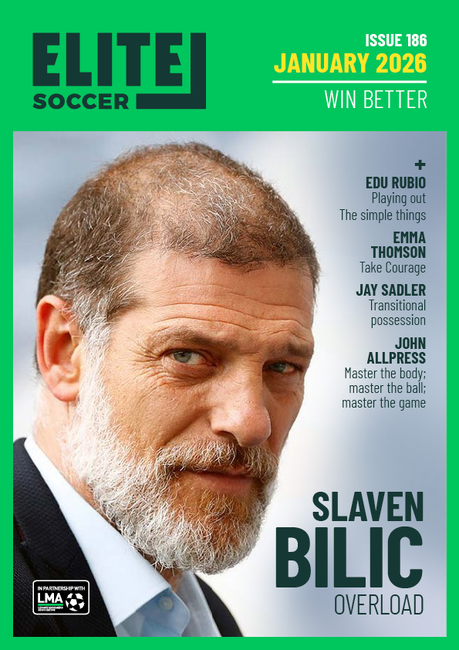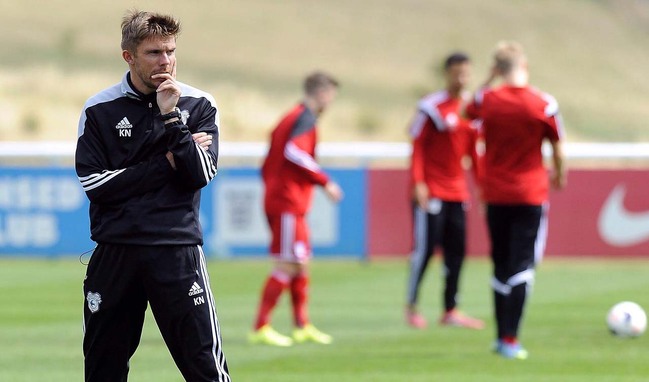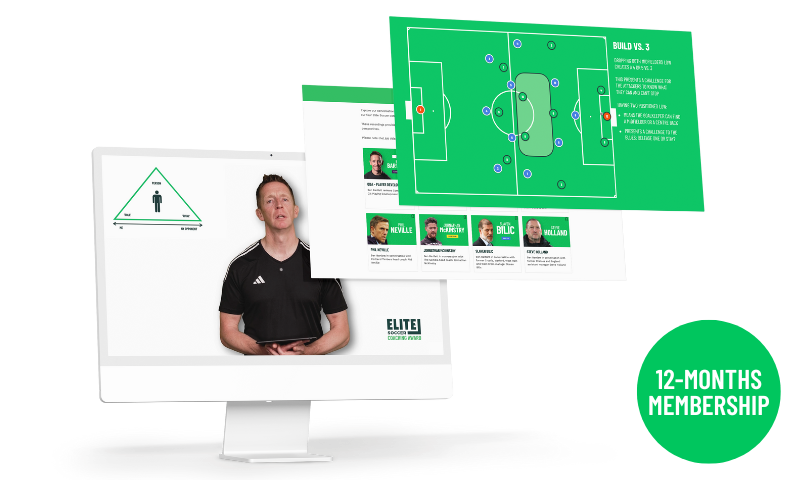
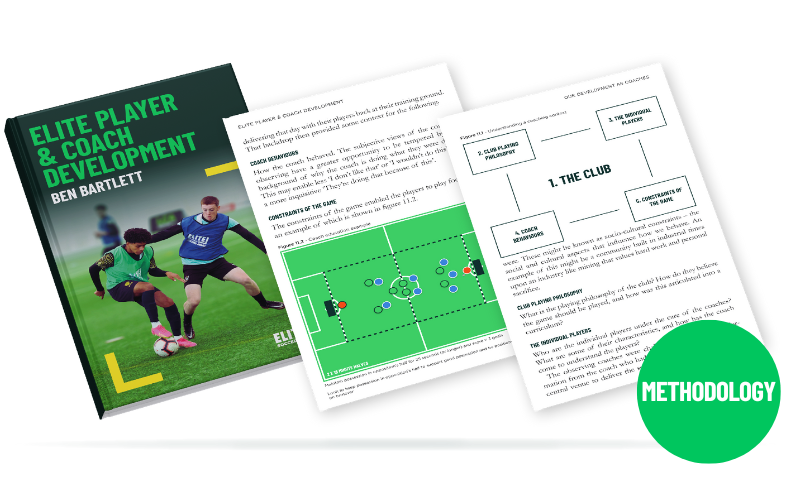
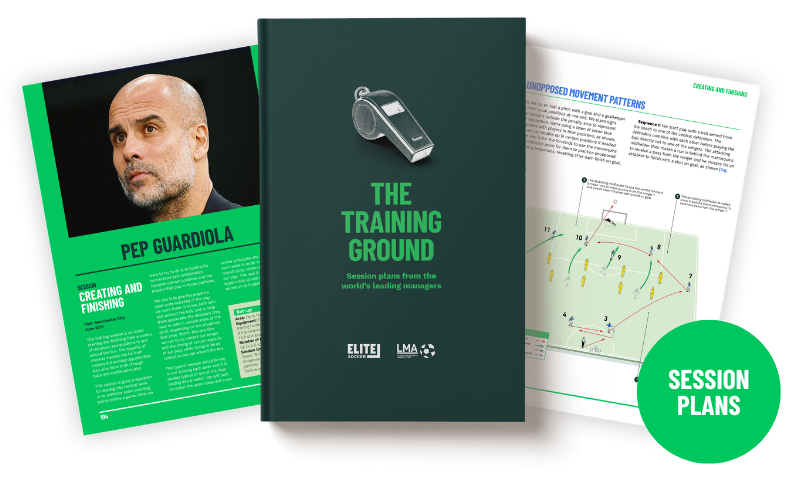
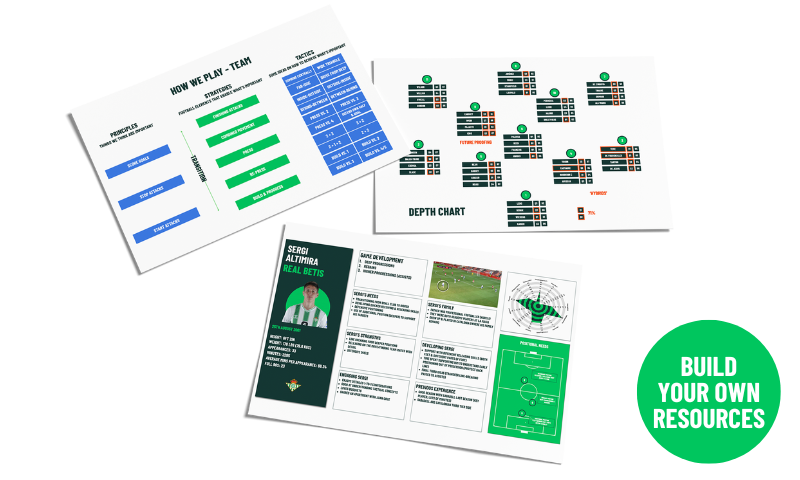

OUR BEST EVER OFFER - SAVE £100/$100
JOIN THE WORLD'S LEADING PROFESSIONAL DEVELOPMENT PROGRAMME
- 12 months membership of Elite Soccer
- Print copy of Elite Player & Coach Development
- Print copy of The Training Ground
You are viewing 1 of your 1 free articles
Defending the box
| Area | Half pitch |
| Equipment | Balls, cones, goals |
| No. of Players | Up to 16 plus keeper |
| Session Time | 10mins each practice |
The session looks at the core ideal of defending the box, and with it, the goal. It uses 1v1, 2v2 and 3v3 systems working in a unit, highlights crosses into the box and works on phase of play against attacking formations.
It’s important to practise this in the first place to achieve what I deem the first step in winning a game – namely keeping a clean sheet. If you can do this the likelihood is you will win the game.
It’s also vital to forge partnerships in defending, with players always knowing where to be when dealing with a ball in the final third. This cements our defensive thinking whilst also providing the platform for the other key element of the game, attacking.
What do I get the players to do?
2v2s (1a/1b)
In the first practice we set up as shown on a half-pitch in 2v2 situations. The keeper begins by feeding the ball in to the attackers, who approach the box. Defenders’ first priority must be to ensure any shot is prevented, and to try to work play so they force a 2v1 situation against the man with the ball, using good communication and adjustments in position.
1a
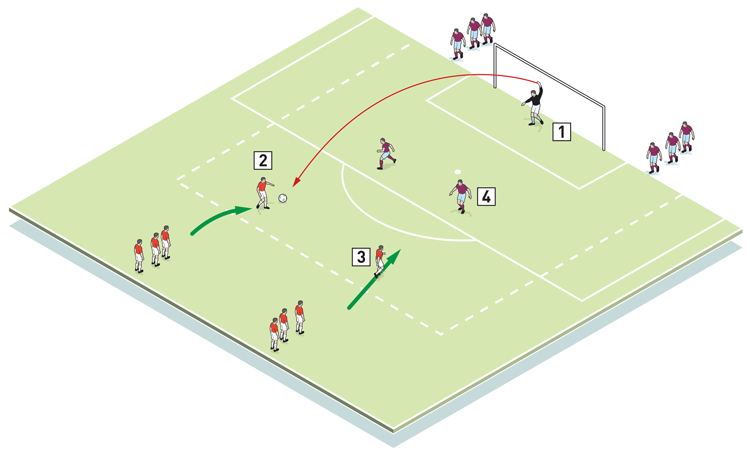
2. The attacker controls the ball and moves forward
3. His fellow attacker moves into the space to support
4. Defenders approach to close down their opponents
1b
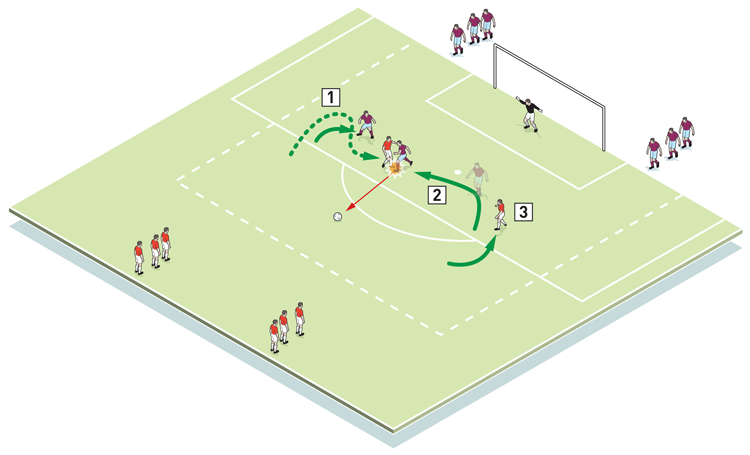
2. The second defender has anticipated a square pass and steps in to clear the danger
3. The supporting attacker takes a wide position
3v3s (2)
Moving into 3v3s, as shown, attackers must now make a sideways pass on the way to attacking the goal.
2
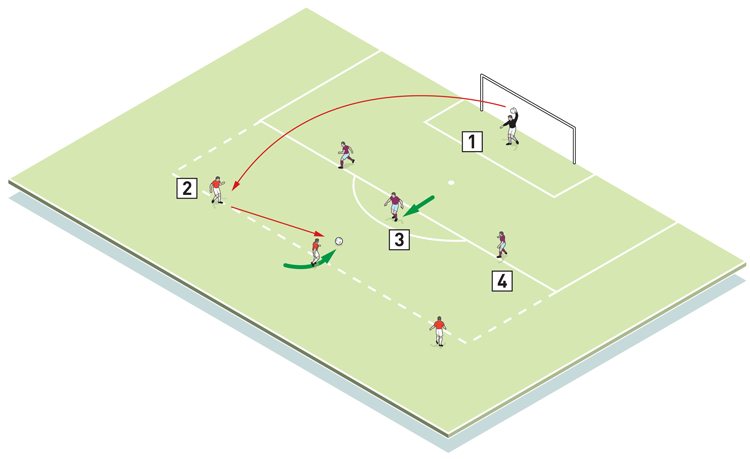
2. A square pass must be made to start the move
3. The nearest defender moves forward to press his opponent
4. Fellow defenders hold their positions, ready to move into necessary areas to support
3v3 plus wingers (3a/3b)
Now we add a wide attacker on each side, meaning defenders must patrol what’s in front of them as well as protecting space left and right. They must adjust and squeeze from the keeper’s serve, preparing to reposition should a crossing situation develop.
3a
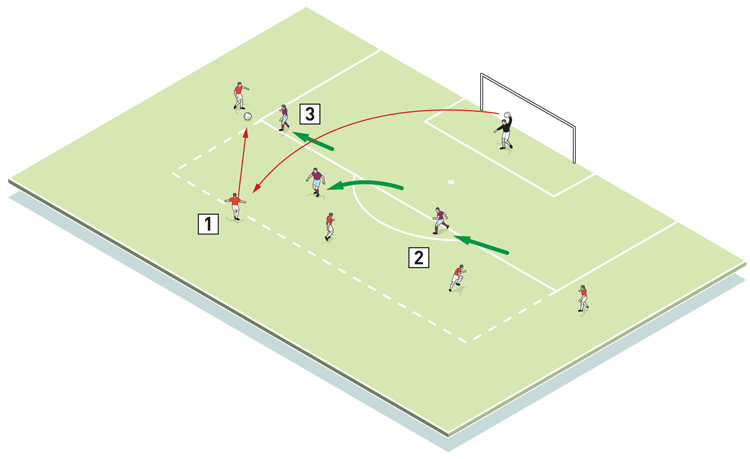
2. Defenders shuffle across while still patrolling the opposition players’ movement
3. The right-sided defender moves out to close down with the aim of preventing the cross
3b

2. The central defender stays with his man and gets goal side to clear the danger
3. The left-sided defender marshals the central attacker and the incoming wide player
Phase of defending (4a/4b/5)
The final practice is 8v7 plus a keeper, and we set up with two defensive midfielders in front of a bank of four plus a midfield pivot who keeps play variable and the tempo high. Wingers are supported by overlapping team mates who must cross or drive inside, while midfielders support and drive forward into the lone striker.
4a
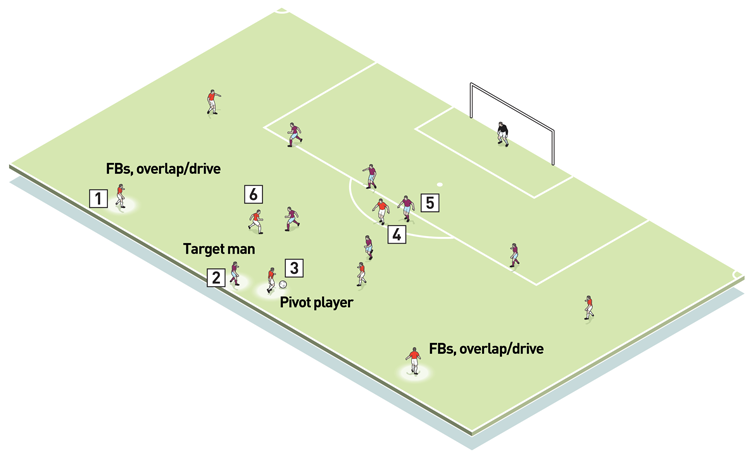
2. A target player is provided in the event of the defence capturing the ball
3. The pivot player can determine whether a ball goes forward, left or right
4. The lone central attacker must be active and on the move in order to negotiate time and space for himself and his team mates
5. Four defenders patrol the edge of the box
6. Attacking midfielders can receive short passes in attempting to reposition defensive midfielders who are looking to block a route through the middle
4b
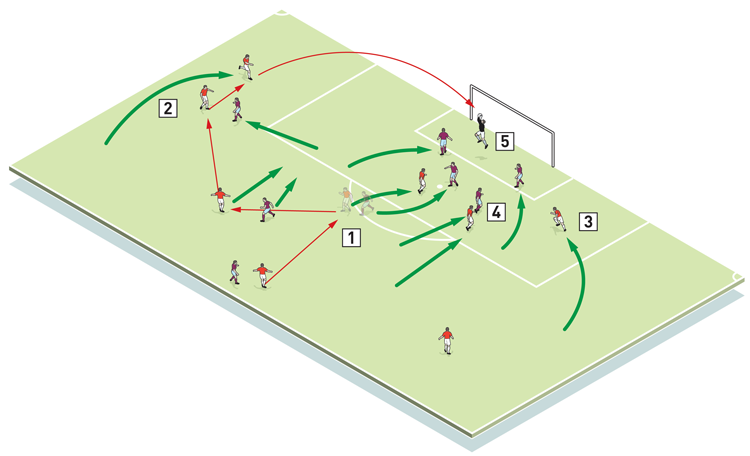
2. The overlapping wide man creates a successful attacking 2v1 situation
3. The opposite winger comes in off the flank to attack the back post
4. Midfielders flood into the box
5. Defenders retreat well and a poor cross is claimed by the keeper
5
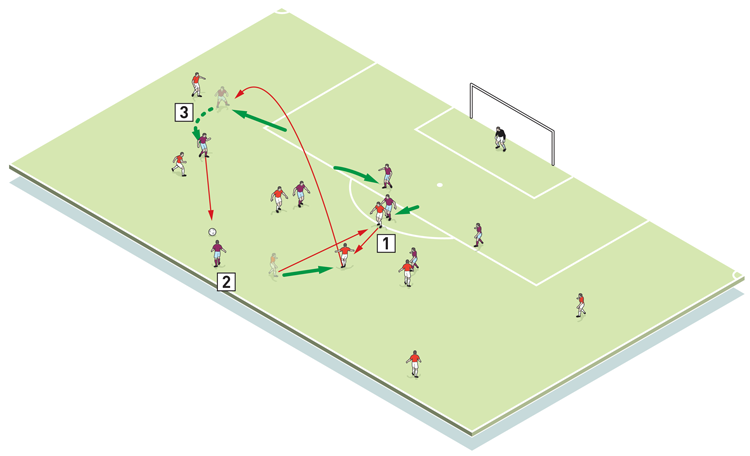
2. He feeds a simple pass out to a defensive midfielder whose position is such that he can easily release the ball out from danger, in the event of an interception
3. On this occasion the right-sided defender is quick to react to the wide pass and steps in to intercept
What are the key things to look out for?
Initially our focus is on players defending as individuals – we want them to assume excellent technical control, clarity of thinking and patience.Next we want to see smart supporting roles with players being able to adjust positions without relinquishing a tight and resilient defensive mindset.
Players must know the key areas to defend, particularly when the threat comes from crosses, and all the time playing in a way that ensures they are compact and hard to break down.
How do I put this into a game situation?
Running this as an 11v11 is important because it brings about match realism. We will use a standard set-up but condition players to defend in certain ways – namely inviting the ball into the final third with those further out being passive, then instructing defenders to protect the goal; or going to the other extreme and defending from the front. Either way the defensive operation must be organised, strict and decisive.Related Files
Editor's Picks
Attacking transitions
Deep runs in the final third
Using the goalkeeper in build-up play
Intensive boxes drill with goals
Penetrating the final third
Creating and finishing
My philosophy
Pressing initiation
Compact team movement
Coaches' Testimonials

Alan Pardew

Arsène Wenger

Brendan Rodgers

Carlos Carvalhal

José Mourinho

Jürgen Klopp

Pep Guardiola

Roy Hodgson

Sir Alex Ferguson

Steven Gerrard
Coaches' Testimonials

Gerald Kearney, Downtown Las Vegas Soccer Club

Paul Butler, Florida, USA

Rick Shields, Springboro, USA

Tony Green, Pierrefonds Titans, Quebec, Canada
Join the world's leading coaches and managers and discover for yourself one of the best kept secrets in coaching. No other training tool on the planet is written or read by the calibre of names you’ll find in Elite Soccer.
In a recent survey 92% of subscribers said Elite Soccer makes them more confident, 89% said it makes them a more effective coach and 91% said it makes them more inspired.
Get Monthly Inspiration
All the latest techniques and approaches
Since 2010 Elite Soccer has given subscribers exclusive insight into the training ground practices of the world’s best coaches. Published in partnership with the League Managers Association we have unparalleled access to the leading lights in the English leagues, as well as a host of international managers.
Elite Soccer exclusively features sessions written by the coaches themselves. There are no observed sessions and no sessions “in the style of”, just first-hand advice delivered direct to you from the coach.



